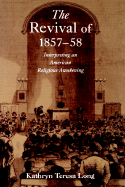
Could God work something wonderful out of the relentlessly negative news? Leave it to evangelicals to find the silver lining amid economic crisis. If revival begins with recognizing our need for God, then perhaps the declining economy will wean Americans from their self-reliance. You would expect no other perspective from people who believe in the redemptive power of suffering.
If you’re not familiar with what renowned Harvard historian Perry Miller termed the “event of the century,” now is the time. We’re talking about the 19th century, but we’re not talking about the Civil War. We’re talking about the nationwide revivals of 1857 and 1858. Kathryn Long of Wheaton College notes that historians have largely ignored these revivals, caught between the Second Great Awakening before 1835 and the Civil War, which broke out in 1861.
Early recollections of the revival traced its origins to a lunch-hour prayer meeting held at North Dutch Church in Manhattan, just a five-minute walk from Wall Street. Former businessman turned missionary Jeremiah Calvin Lanphier hosted the sparsely attended first meeting on September 23, 1857. Yet week by week the gathering grew, spawning copycat prayer meetings around New York City. Within six months, businessmen across the country met during their lunch hours to pray that God would work among them in a special way.
What led these businessmen to devote their lunch hours to prayer? Long describes the buildup to the Panic of 1857. “A financial crisis had been brewing through the boom years of the 1850s, a period when Americans had indulged in a ‘national predilection for speculations of all sorts,’ including get-rich-quick schemes involving commodities, securities, mortgages, and above all, land speculation,” Long writes in Revival of 1857-58, published by Oxford in 1998. Ohio Life Insurance and Trust Company’s New York branch collapsed in August. When banks began demand payment on outstanding loans, panic spread. “Money became tighter, distrust spread, financial uncertainty grew throughout September, and rural banks and city businesses began to fail.” While the U.S. economy had suffered other downturns, the Panic of 1857 devastated American families of every class in every state.

It would be a mistake, however, to attribute the revival to economic circumstances alone. J. Edwin Orr makes this point clear in his indispensable book on the revival. In his chapter “Prayer, Spontaneous and Concerted,” Orr writes, “Without a hint of panic or hysteria, there was a quiet, widespread, steady spirit of prayer throughout the country, quite apart from the noontime gatherings in the premises of the Dutch Reformed Church in Fulton Street.” Yet as Long notes, the prayer meetings sought the conversion of drunkards and prostitutes with less regard for slavery and the looming threat of war. Before war erupted, the revival had faded.
Yet the remarkable events of 1857 and 1858 left behind a lasting legacy. Evangelist D.L. Moody, who turned 21 in 1858, longed to relive the events of his youth. “Moody’s later evangelistic ‘innovations’ were in large part systematic recreations of techniques from the prewar spiritual awakening, refined through years of practice with the YMCA,” Long writes. Denominations welcomed thousands of new members. Participants evangelized soldiers on both sides of the Civil War. Sunday schools blossomed. Anna Warner wrote a new song for these children that would last longer than memory of the revivals.
“Jesus loves me, this I know;
For the Bible tells me so:
Little ones to Him belong;
They are weak, but He is strong.”
Though written for children, the message sustains Christians of any age during any crisis.








